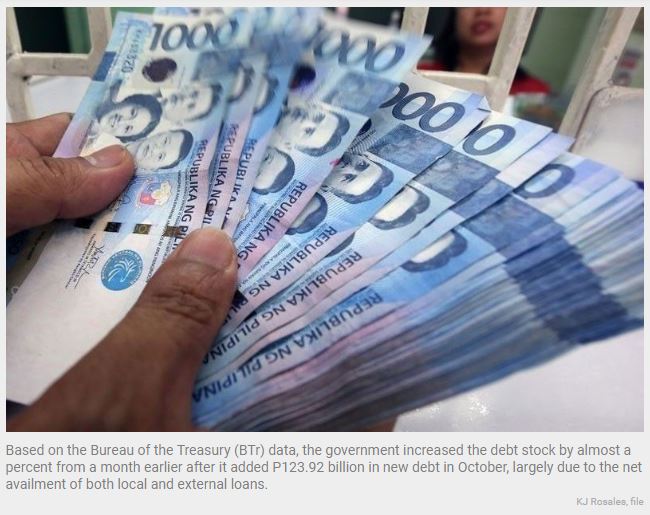Philippine debt swells to P13.6 trillion in October
MANILA, Philippines — The government is strongly pushing for the creation of the Maharlika Wealth Fund as it faces constraints to finance new projects, especially after the country’s outstanding debt jumped to a new record high P13.64 trillion in October.
Based on the Bureau of the Treasury (BTr) data, the government increased the debt stock by almost a percent from a month earlier after it added P123.92 billion in new debt in October, largely due to the net availment of both local and external loans.
On a yearly basis, the debt pile jumped by nearly 14 percent from the P11.97 trillion a year ago.
For the four months in office of the Marcos administration, it has so far borrowed P849.189 billion. Likewise, the current debt stock is already 1.56 percent above the P13.43 trillion expected debt pile by the end of the year.
Leonardo Lanzona, economist and professor at the Ateneo de Manila University, argued that the current debt stock imposes a serious constraint on the government’s ability to finance new projects and counter inflation.
“This explains why Congress is prioritizing the Maharlika Wealth Fund. The issue is that it places the country’s long-term security at risk,” Lanzona told The STAR.
Union Bank of the Philippines chief economist Ruben Carlo Asuncion concurred, noting that Finance Secretary Benjamin Diokno recently touched on the government’s reserves being aplenty and not being used for more productive purposes.
But Bank of the Philippine Islands lead economist Jun Neri argued that by the end of the year, the country’s external debt, both private and public, would already exceed the central bank’s reserves for the first time in 11 years.
“The word wealth connotes a stock, not a flow concept. Can we even speak of a net stock of external wealth these days?” Neri said.
Foundation for Economic Freedom president Calixto Chikiamco said trade and current account deficits are worsening while the country faces external headwinds from the global economic environment.
“It is, therefore, not correct (to say) that we have so much reserves we can afford to part with it to fund the Maharlika Wealth Fund. If the national government siphons off our forex reserves, the financial ammunition available to the central bank will diminish and give ground for speculators to attack the peso,” Chikiamco said.
For Lanzona, with an impending global recession next year, the country’s debt stock is at risk of further increasing.
“The best alternative is to impose a wealth tax. It is up to this generation to pay for these obligations instead of placing a burden on the future generations, which will be the case if the wealth fund is used to finance these loans,” Lanzona said.
Chikiamco reiterated that creating a sovereign wealth fund is the wrong instrument for what they say they want to do.
Meanwhile, the Treasury said domestic borrowings accounted for the majority or 69 percent of the debt pile while the remaining 31 percent was sourced externally.
Total domestic debt at P9.36 trillion slightly inched up by 0.59 percent on a monthly basis, but jumped 10.5 percent from the P8.47 trillion year-on-year.
The increase was attributed to the net issuance of P55.83 billion in government securities.
The peso appreciated against the dollar to P58.047 as of end-October.
Domestic debt has already increased by 14.5 percent to P1.18 trillion since the start of the year due to continued preference for domestic financing to mitigate the effects of currency fluctuations.
External obligations, on the other hand, also increased by 1.64 percent to P4.29 trillion month-on-month and surged by nearly 22.3 percent from P3.5 trillion in the same period last year.
The Treasury said the increment in external debt was due to the P118.71 billion net availment of foreign financing.
But this was partly offset by the favorable net impact of both local and third-currency fluctuations against the dollar amounting to P43.07 billion and P6.30 billion, respectively.
Meanwhile, total debt guaranteed obligations decreased by 2.69 percent to P386.53 billion due to the net repayment of domestic guarantees amounting to P7.3 billion and the impact of currency fluctuation.
Source: https://www.philstar.com/business/2022/12/08/2229253/philippine-debt-swells-p136-trillion-october


 Thailand
Thailand




